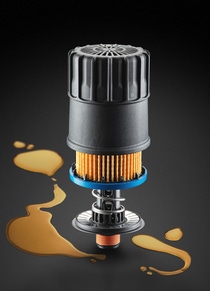Media
BASF and Hengst develop reusable spin-on oil filter made of engineering plastic Ultramid® Structure LFX
- Blue.on by Hengst sets standards in sustainability: reusable, recyclable and lightweight
- Awarded with the Innovation Prize of German federal state North Rhine-Westphalia
BASF and Hengst have developed the world’s first reusable plastic spin-on oil filter module for cars. Blue.on is the sustainable alternative to conventional spin-on modules made from metal, since it does not need to be replaced during filter change. It is made from Ultramid® Structure LFX, a long glass fiber-reinforced high-performance plastic from BASF whose specific properties provide new opportunities for metal substitution. Blue.on offers a solution to a key problem of the automotive industry when it comes to oil filter change: each year, about two billion oil filters are replaced and disposed. During oil change, the entire filter unit is exchanged, and the residual oil is disposed as hazardous waste. Moreover, a big amount of additional litter is generated.
Ultramid® Structure LFX makes the difference
The new module Blue.on is deployed by leading automotive manufacturers and consists of three components: a filter housing, a connection element to the engine and a filter element. During oil change, only the filter is replaced, whilst the module completely made of plastic can be used for the entire service life of the engine. At the end of the car’s life cycle, all components can almost completely be recycled. As a side benefit, the material leads to a weight reduction of the module of 23 percent compared to its metal counterpart.
The sustainable solution for the highly-stressed part was realized by Ultramid® Structure A3WG12 LFX. BASF’s Ultramid® Structure grades are long glass fiber-reinforced polyamides with a special property profile: Besides outstanding mechanical characteristics at high temperatures, the material shows a low tendency to creep as well as reduced shrinkage and warpage. These properties make the innovative spin-on concept possible. Because of the long glass fibers and the resulting changed fiber orientation a dimensionally stable part is formed. During the injection-molding process the glass fibers form a three-dimensional network in the part leading to a very good surface quality.
Partnership paves the way to success
“Hengst presented to us the idea of developing a resource-saving alternative to metal housings showing the same performance”, says Christian Janeba, Senior Key Account Manager in BASF’s Performance Materials division. “We supported the development process constructively with material development and a comprehensive engineering package, focusing on sustainability at all times.”
Next to plastics engineering advice and component testing, BASF’s simulation tool Ultrasim® was employed: “The development took a lot of time, but the result is highly convincing”, says Michael Böhm from Hengst. “All partners were not only eager to find an innovative technical component, but also a sustainable solution for the automotive industry and car drivers. Innumerable tests and trials to which BASF contributed its comprehensive know-how in plastics finally led to a positive outcome.” In 2018, Blue.on was awarded the Innovation Prize of the state of North Rhine-Westphalia, Germany, even before it went into serial production.
Visit us at the VDI conference „Plastics in Automotive Engineering“ from 25 to 26 March in Mannheim.
More information:
www.ultramid-structure.basf.com
www.hengst.com
About BASF’s Performance Materials division
BASF’s Performance Materials division encompasses the entire materials’ know-how of BASF regarding innovative, customized plastics under one roof. Globally active in four major industry sectors – transportation, construction, industrial applications and consumer goods – the division has a strong portfolio of products and services combined with deep understanding of application-oriented system solutions. Key drivers of profitability and growth are our close collaboration with customers and a clear focus on solutions. Strong capabilities in R&D provide the basis to develop innovative products and applications. In 2019, the Performance Materials division achieved global sales of €6.06 bn. More information online: www.plastics.basf.com.
About BASF
At BASF, we create chemistry for a sustainable future. We combine economic success with environmental protection and social responsibility. More than 117,000 employees in the BASF Group work on contributing to the success of our customers in nearly all sectors and almost every country in the world. Our portfolio is organized into six segments: Chemicals, Materials, Industrial Solutions, Surface Technologies, Nutrition & Care and Agricultural Solutions. BASF generated sales of €59 billion in 2019. BASF shares are traded on the stock exchange in Frankfurt (BAS) and as American Depositary Receipts (BASFY) in the U.S. Further information at www.basf.com.
P-20-145


